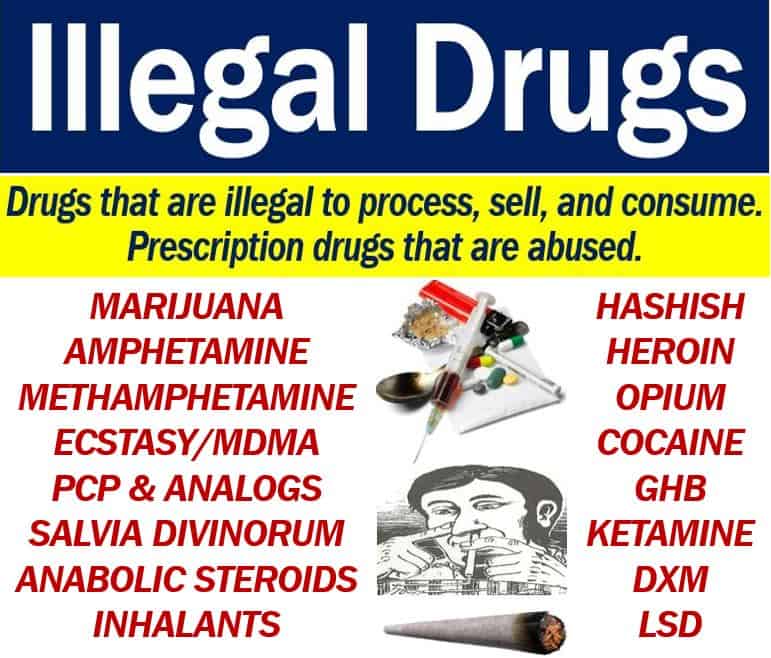Illegal drugs – definition and meaning
Illegal drugs are drugs whose production, distribution, or use are either forbidden or only allowed via a doctor’s prescription. An illegal drug is also a prescription drug that somebody has dangerously modified. Recreational drugs, such as heroin, cocaine, and ecstasy, for example, are illegal drugs. If you use an illegal drug, you are not only breaking the law but also endangering your health.
A drug is a chemical or substance that affects how our body functions if we swallow, inject, snort, or breathe it in. Illegal drugs are those that the law does not allow.
Illegal drugs have different effects on people. Different factors determined how these drugs affect people who consume them.
Therefore, an illegal drug is unpredictable and potentially very dangerous.
DrugRehab.co.uk says the following regarding illegal drugs:
“Illegal drugs come in different shapes, sizes, and types. Each particular drug produces unique effects on the user; this is why you may have heard the term ‘drug of choice.’ This means, the drug that the user prefers.”

Why take illegal drugs?
People take illegal drugs for many possible reasons, such as:
– Boredom.
– Peer pressure or to fit it.
– Experimentation, i.e., to try out something because the person is curious.
– To control pain. The individual may have started off using a painkiller. Over time they increased the dosage. Eventually, they wanted a dosage that the doctor would not prescribe. Out ‘in the street’ they found other more potent painkillers.
– Grooming. Typically, a young person, such as a teenager, meets a stranger who befriends them. The stranger persuades them, for example, that an illegal drug is ‘cool.’
Initially, that person gives them freebies (free pills). After a while, that person says they cannot get any more. However, if they pay for it, they might be able to get some, etc.
Illegal drugs – effects
An illegal drug affects the way our body functions. It may also affect our minds. Some drugs affect both the body and the mind.
According to PositiveChoices.org.au, the following factors influence the effects of a drug:
– What type of drug the individual consumes.
– Where the consumer is when he or she uses it.
– How much the person consumes.
– What the person is doing when they are using the drug.
– The person’s health, body size, age, i.e., their overall characteristics.
– What else the consumer used when they used that drug. In other words, how many drugs, including alcohol, they took simultaneously. Even though alcohol is not illegal, it may influence the effect of an illegal drug on a human being.
Illegal drugs – types
There are many different types of illegal drugs. Below is a list of the most common ones:
– Cannabis or Marijuana.
– MDMA or Ecstasy.
– Cocaine.
– GHB or Gamma-HydroxyButyrate.
– Heroin.
– Hallucinogens.
– Inhalants.
– Methamphetamine.
Depressants
A depressant slows down the central nervous system. It also slows down the messages that travel between the brain and the body.
Depressants reduce our concentration and undermine our ability to respond, i.e., we respond to things more slowly.
The term ‘depressant’ in this context does not mean that the substance makes the consumer depressed. The term refers to the drug’s slowing-down effect on the body’s central nervous system.
Stimulants
Stimulants, in the world of drugs, are the opposite of depressants, i.e., they speed up the nervous system. We also refer to stimulants as psychostimulants.
Stimulants increase energy and heart rate. They also affect our appetite. Methamphetamine (ice, base, speed), cocaine, and ecstasy, for example, are stimulants.
Hallucinogens
Hallucinogens alter how we perceive the world around us. They change the way we hear, see, taste, smell, or feel things.
This type of drug can make us experience things that are not happening. LSD, magic mushrooms, and ketamine, for example, are hallucinogens.
The underground economy
The production, sale, distribution, and purchase of illegal drugs occur in the underground economy.
The underground economy is part of the economy that operates ‘under the radar,’ i.e., the authorities do not know about it. We also call it the informal sector.

